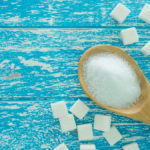By David Blyweiss, M.D., Advanced Natural Wellness
March 16, 2020
What is going on with coffee these days? Have you noticed this too?
I went into a local Starbucks the other day and I was mystified by the menu…
All around me, people were placing orders for things like café mocha, caramel macchiato and cinnamon dolce latte. Other words like “whip”, “pump”, “syrup” and “non-fat” were being tossed around at high speed as the baristas whirled behind the counter.
Tall paper cups with names marked in black were lined up on the counter for customers to grab on their way out the door.
I just shook my head in wonder…
The Starbucks Grande Mocha Cookie Crumble Frappuccino ordered by the lady in front of me may sound delicious. But along with the coffee, she’s also getting a whopping 470 calories, 15 grams of saturated fat, and 57 grams of sugar….and paying over $5.00 for it.
Open your arteries, improve blood flow for a new health miracle...
Did you know your circulatory system has over 60,000 miles of arteries, veins and other blood vessels, if stretched end to end?
But as you age, your blood vessels undergo changes, which may cause them to stiffen, thicken and get clogged.
GOOD NEWS! Doctors have now identified a “Miracle Molecule” inside your arteries that helps OPEN your arteries and IMPROVE blood flow.
It’s what Dr. Valentin Fuster calls it, "One of the most important discoveries in the history of cardiovascular medicine."To you, that means...
- Healthy blood pressure
- Sharper mind and memory
- Skyrocketing energy and muscular strength
- Increased pleasure and passion in the bedroom
- Improved circulation to every cell and organ in your body
Go here to discover a new natural way to significantly boost the levels of this miracle molecule in YOUR body NOW!
Personally, I usually opt for a much simpler plain, dark roast coffee. On occasion, I’ll also add in some healthy non-dairy French vanilla creamer.
Sure, this may sound boring. But when it comes to coffee, boring is a good thing.
You see, coffee has a long list of health benefits for your mind and body. But when we layer on tons of excess sugar and calories, we turn a “healthy” beverage into one better left for rare occasions.
For instance, regularly enjoying coffee – without the added creams, sugars, and syrups – is associated with all sorts of positive health outcomes:
- Coffee protects your brain’s vascular system, which in turn reduces the risk of dementia. Drinking a few cups before 4 pm in middle age cuts dementia risk by around 65% in later years. It also helps stave off Alzheimer’s disease. I opt for one cup of regular in the morning and decaffeinated in the afternoon if I’m not drinking my green tea then.
- Coffee drinkers have as much as a 30% lower risk of Parkinson’s disease compared to non-drinkers. Coffee also slows progression of the disease by about eight years.
- Regular coffee intake helps improve glucose tolerance and insulin sensitivity associated with type 2 diabetes and is associated with at least a 15% reduction in cardiovascular risk, supports liver function, protects against certain cancers and extends life.
Not too shabby, right? So, let’s take a look at some tasty ways to make your coffee healthy again.
5 Easy Ways to Make Your Coffee Healthy Again
First off, the best way to destroy the life-extending effects of a cup of coffee is to load it down with sugar, cream, artificial sweeteners and all of those chemically flavored creamers available these days.
And if you’re drinking several of these concoctions daily, you’re certainly doing more harm than good.
I’m happy to say that you can get similar flavor-enhancing results naturally! Here are five easy ways to make your coffee healthy again:
- Always make sure you select a blend made from organic coffee beans to avoid heavy pesticide residue. I lean towards darker roasts, as they have lower levels of anti-nutrients in them.
- Choose the best brewing method. Most of today’s drip coffee makers are made of plastic. And the newer, fancier brewers use plastic coffee pods. All of these plastics leach into your coffee when they’re exposed to heat.
As such, I prefer using a glass coffee maker. It’s simply a glass carafe with a paper filter. Paper filters may also have positive effects on blood cholesterol. I measure out my own organic coffee blend, and then just pour boiling water through the filtered grounds. Old fashioned stainless steel coffee percolators work well too.
Are You Suffering From...
- Love handles and a pot belly
- Romance that isn't what it used to
- Forgetfulness and inattention
- Low (or no) strength and endurance
- A sex drive that's shifted into neutral...or worse
If so...you may have Mature Male Burnout. Click here to discover more about this unique condition and what you can do about it.
- If you like added flavor, there are plenty of choices. You can add a cinnamon stick or fresh, powdered cinnamon. Unsweetened organic cocoa powder is another tasty way to perk up your coffee. Or add a drop or two of pure vanilla extract.
If you feel like getting adventurous, you can even spice your coffee up with turmeric or ginger! Each of these flavorings come with its own health benefits and can enhance the protective power found in a cup of coffee.
- Can’t stomach coffee without a touch of sweetness? Try stevia. It’s the only sweetener I recommend to my patients. Unlike sugar, high fructose corn syrup and artificial sweeteners, it actually has a positive effect on your weight, blood sugar and insulin response.
- What about the cream? If you normally put a little milk in your coffee, opt for almond milk. If you’re more likely to load your coffee with heavy cream, coconut milk creamer may be more to your liking.
Here’s a great example of a healthy, yet super tasty and creamy sweetener:
Pour a can of coconut milk into a glass storage container. Add stevia to your sweetness level. Then, add a tablespoon of vanilla… or cocoa… or a dash of cinnamon… or all three. Blend it together and you’ve got a delicious creamer that’s good for you.
SOURCES:
Wierzejska R. Can coffee consumption lower the risk of Alzheimer’s disease and Parkinson’s disease? A literature review. Arch Med Sci. 2017 Apr 1;13(3):507-514.
Bidel S, et al. The Emerging Health Benefits of Coffee with an Emphasis on Type 2 Diabetes and Cardiovascular Disease. Eur Endocrinol. 2013 Aug;9(2):99-106.
Rodríguez-Artalejo F, et al. Coffee Consumption and Cardiovascular Disease: A Condensed Review of Epidemiological Evidence and Mechanisms. J Agric Food Chem. 2018 May 30;66(21):5257-5263.
Giridhar P, et al. Evaluation of Roasting and Brewing effect on Antinutritional Diterpenes-Cafestol and Kaweol in Coffee. Global Journal of Medical Research. 2011; 11(5).
Rao PV, et al. Cinnamon: A Multifaceted Medicinal Plant. Evid Based Complement Alternat Med. 2014; 2014: 642942.
Andújar I, et al. Cocoa Polyphenols and Their Potential Benefits for Human Health. Oxid Med Cell Longev. 2012; 2012: 906252.
Shyamala BN, et al. Studies on the antioxidant activities of natural vanilla extract and its constituent compounds through in vitro models. J Agric Food Chem. 2007 Sep 19;55(19):7738-43.
Hewlings SJ, et al. Curcumin: A Review of Its’ Effects on Human Health. Foods. 2017 Oct; 6(10): 92.
Mashhadi NS, et al. Anti-Oxidative and Anti-Inflammatory Effects of Ginger in Health and Physical Activity: Review of Current Evidence. Int J Prev Med. 2013 Apr; 4(Suppl 1): S36–S42.
Mocha Cookie Crumble Frappuccino® Blended Beverage. Starbucks.com. Available Online: https://www.starbucks.com/menu/product/956/iced
Wierzejska R. Can coffee consumption lower the risk of Alzheimer’s disease and Parkinson’s disease? A literature review. Arch Med Sci. 2017 Apr 1;13(3):507-514.
Bidel S, et al. The Emerging Health Benefits of Coffee with an Emphasis on Type 2 Diabetes and Cardiovascular Disease. Eur Endocrinol. 2013 Aug;9(2):99-106.
Rodríguez-Artalejo F, et al. Coffee Consumption and Cardiovascular Disease: A Condensed Review of Epidemiological Evidence and Mechanisms. J Agric Food Chem. 2018 May 30;66(21):5257-5263.
Giridhar P, et al. Evaluation of Roasting and Brewing effect on Antinutritional Diterpenes-Cafestol and Kaweol in Coffee. Global Journal of Medical Research. 2011; 11(5).
Rao PV, et al. Cinnamon: A Multifaceted Medicinal Plant. Evid Based Complement Alternat Med. 2014; 2014: 642942.
Andújar I, et al. Cocoa Polyphenols and Their Potential Benefits for Human Health. Oxid Med Cell Longev. 2012; 2012: 906252.
Shyamala BN, et al. Studies on the antioxidant activities of natural vanilla extract and its constituent compounds through in vitro models. J Agric Food Chem. 2007 Sep 19;55(19):7738-43.
Hewlings SJ, et al. Curcumin: A Review of Its’ Effects on Human Health. Foods. 2017 Oct; 6(10): 92.
Mashhadi NS, et al. Anti-Oxidative and Anti-Inflammatory Effects of Ginger in Health and Physical Activity: Review of Current Evidence. Int J Prev Med. 2013 Apr; 4(Suppl 1): S36–S42.
Mocha Cookie Crumble Frappuccino® Blended Beverage. Starbucks.com. Available Online: https://www.starbucks.com/menu/product/956/iced







